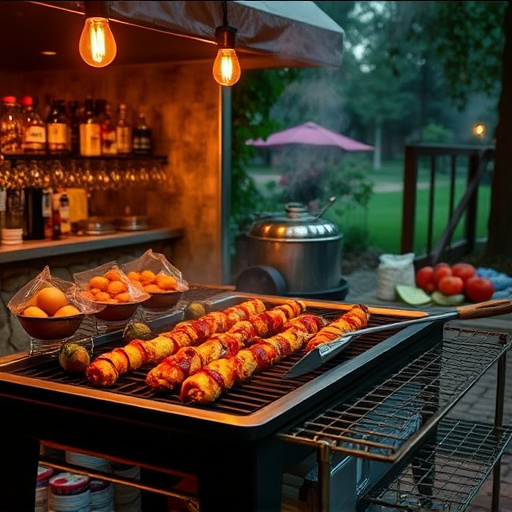Mastering a perfect BBQ chicken grill involves understanding ideal cooking temperatures (350-450°F/175-230°C) and times, adjusted for meat thickness. Marinades are crucial for flavor, tenderness, and even cooking. Key factors include marination duration, heat control, and monitoring internal temperature with a thermometer to ensure safe, juicy results (165°F/74°C). Avoid common mistakes like overcooking or underestimating grilling time. Experiment with grill types and settings to create your ideal BBQ chicken grill recipe.
Unleash the perfect BBQ chicken grill recipe with the ideal temperature and timing! Mastering these aspects is key to juicy, flavorful meat. This comprehensive guide delves into the science behind cooking temperatures, exploring how marinades play a vital role in managing heat. Learn about factors influencing grilling time and discover tips for accurate internal temperature measurement. Avoid common mistakes and explore variations tailored to your grill and taste preferences.
- Understanding BBQ Chicken Cooking Temperatures
- The Role of Marinades in Temperature Management
- Grilling Time: Factors Influencing Doneness
- Tips for Accurately Measuring Internal Temperature
- Common Mistakes to Avoid During Grilling
- Variations Based on Grill Type and Personal Preference
Understanding BBQ Chicken Cooking Temperatures
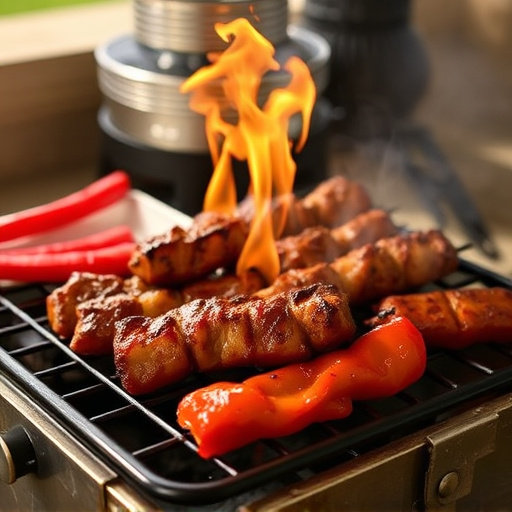
Understanding BBQ Chicken Cooking Temperatures is key to unlocking a juicy, flavorful piece of chicken in every bite. The perfect temperature for grilling BBQ chicken typically ranges between 350-450°F (175-230°C). This range ensures that the chicken cooks evenly, allowing for a crispy exterior and tender, moist interior.
The cooking time will vary based on the thickness of the chicken pieces. Thicker cuts like drumsticks or bone-in thighs may require up to 45 minutes per pound at these temperatures, while thinner cuts such as breasts or boneless thighs could be ready in as little as 20-30 minutes. Mastering the art of BBQ chicken grilling involves monitoring both time and temperature closely for optimal results in your bbq chicken grill recipe.
The Role of Marinades in Temperature Management
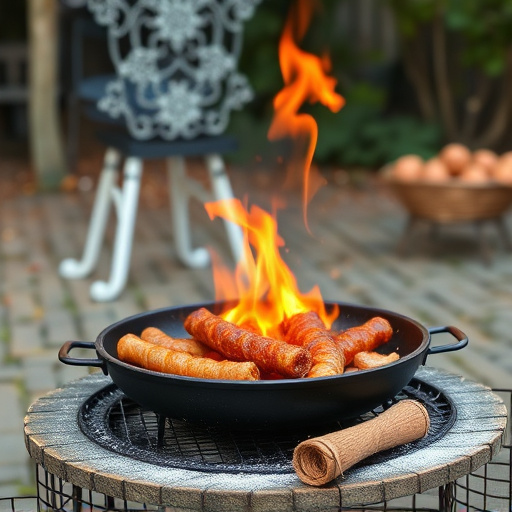
Marinades play a significant role in managing the temperature and cooking time for BBQ chicken grill recipes. They work as more than just a flavorful addition; these seasoned sauces help to break down the meat’s fibers, making it tenderer and ensuring even cooking. The acid components in marinades, such as lemon juice or vinegar, help to denature proteins, while oils and butter contribute to keeping the chicken moist during the grilling process.
Proper marinade penetration is key to achieving optimal results. Longer marination times allow the flavors to penetrate deeper into the meat, but it’s essential not to overdo it, as excessive soaking can lead to a mushy texture. For most BBQ chicken grill recipes, a 2-4 hour marinade time is ideal, allowing enough time for the flavors to develop without causing the meat to become too soft. This balanced approach ensures that your grilled chicken turns out juicy, flavorful, and perfectly cooked every time.
Grilling Time: Factors Influencing Doneness
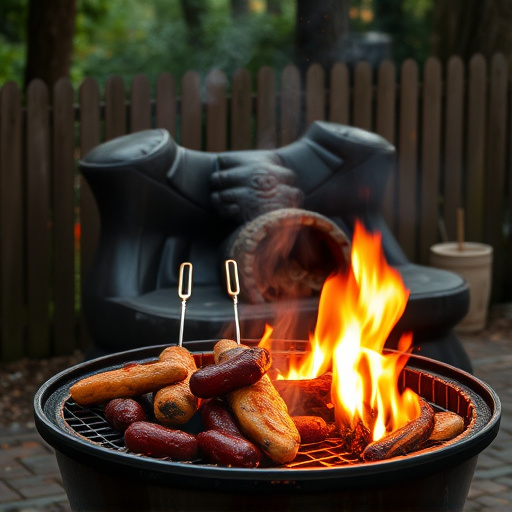
The perfect BBQ chicken grill recipe isn’t just about selecting the right cuts of meat; it’s equally crucial to understand how grilling time and temperature work together to create a mouthwatering meal. Several factors can influence the doneness of your barbecue chicken, ensuring both safety and flavor. Marination time plays a significant role; longer marinades often require slightly less cooking time due to the enhanced tenderness from the marinade’s acidity. The thickness of the chicken pieces is another critical variable. Thicker cuts like drumsticks or bone-in breasts take more time on the grill compared to thinner cuts like boneless, skinless thighs.
Temperature control is key; a consistent heat ensures even cooking without overcooking the exterior while keeping the interior moist and tender. Charred exterior marks are desirable for flavor, but too much charring can indicate overcooking. Using a meat thermometer is a reliable method to determine if the chicken has reached its safe internal temperature of 165°F (74°C), ensuring it’s cooked thoroughly without compromising its juicy texture.
Tips for Accurately Measuring Internal Temperature
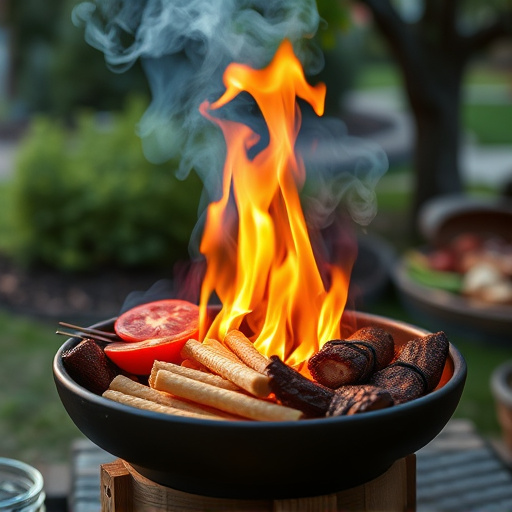
To ensure your BBQ chicken grill recipe turns out perfectly, accurately measuring the internal temperature of your meat is key. Start by using a reliable meat thermometer to check the temperature in the thickest part of the thigh, ensuring it reaches 165°F (74°C). This temperature is recommended by food safety experts as the safe minimum for chicken to prevent harmful bacteria like Salmonella from thriving.
When grilling, be mindful that different cuts of chicken may take varying amounts of time to cook evenly. A whole chicken will require a longer grill time than individual parts like breasts or thighs. Regularly rotate your meat during cooking to ensure even heating and use the thermometer as a guide to avoid overcooking, which can lead to dry, tough meat.
Common Mistakes to Avoid During Grilling
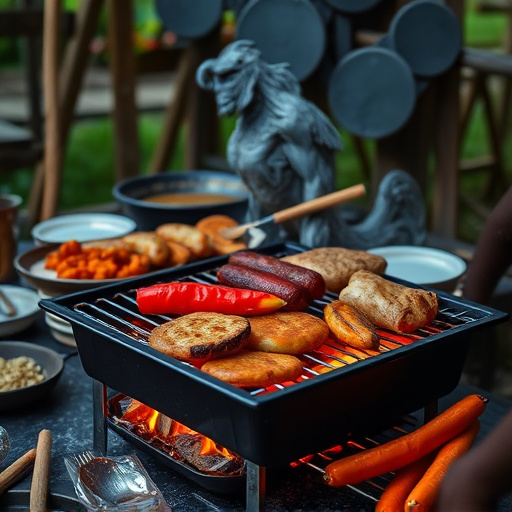
When grilling BBQ chicken, avoid common pitfalls that can ruin your meal. One of the most frequent mistakes is overcooking the chicken due to high heat and a lack of attention. This can result in dry, tough meat. It’s crucial to maintain a consistent medium-low heat throughout the cooking process, allowing the natural juices to stay locked in for tender, flavorful meat.
Another blunder is underestimating grilling time. Every BBQ chicken grill recipe varies slightly based on thickness and desired doneness. Always account for these factors and use a meat thermometer to ensure your chicken reaches an internal temperature of 165°F (74°C), killing any potential bacteria while preserving moisture. Neglecting this detail can lead to undercooked, unsafe food, so stay vigilant and plan accordingly.
Variations Based on Grill Type and Personal Preference
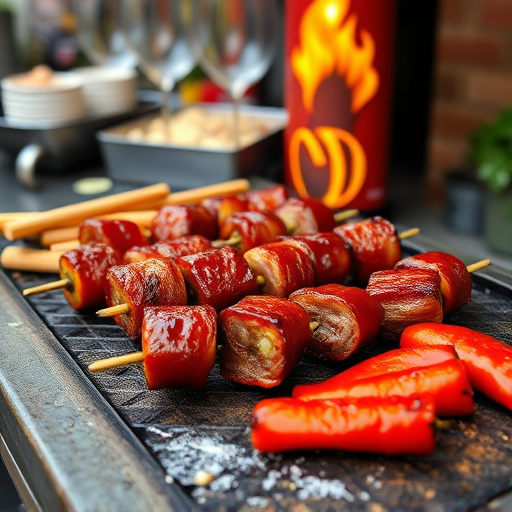
The perfect BBQ chicken grilling time and temperature can vary based on your specific grill type and personal preference, making it an art rather than a science. For instance, charcoal grills tend to heat up quickly but may not maintain even heat as long as gas grills. As such, they might require slightly longer cooking times at lower temperatures for tender, juicy chicken. In contrast, gas grills offer more consistent temperature control, allowing for precise timing and easier adjustments based on desired doneness.
Personal preference plays a significant role too. Some grill enthusiasts prefer their BBQ chicken charred for an extra smoky flavor, which might mean higher heat settings but shorter grilling times. Others opt for a milder taste and more tender meat by cooking at lower temperatures for a longer duration. Experimenting with different grill settings and timings is key to crafting your ideal BBQ chicken grill recipe, ensuring each bite is perfectly cooked to your liking.
